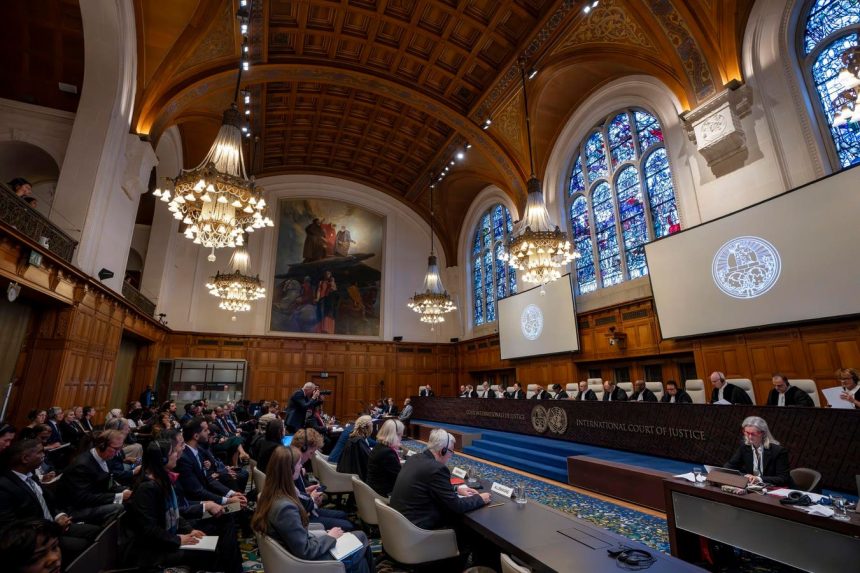The International Court of Justice (ICJ), also known as the World Court, held public hearings in December 2024 concerning the obligations of states regarding climate change. This advisory opinion, requested by the UN General Assembly, seeks to clarify the financial responsibilities nations bear for their contributions to climate change and the actions they must undertake to mitigate it. At the heart of these proceedings lies a crucial debate: whether a “right to a clean, healthy, and sustainable environment” exists under international law. This question has become a focal point of contention among participating states, with divergent perspectives on its legal basis and implications. The ICJ’s advisory opinion, while not legally binding, will undoubtedly influence future climate litigation and policy development, providing a significant benchmark for interpreting international environmental law.
The request for the advisory opinion stemmed from a March 2023 appeal by Vanuatu, a Pacific island nation acutely vulnerable to the impacts of climate change. Over two weeks, more than 100 countries and organizations presented their arguments before the ICJ, focusing on the Paris Agreement and the responsibilities it places on nations to reduce greenhouse gas emissions. The hearings also delved into the broader question of whether a human right to a clean environment exists, a concept gaining traction in international legal discourse. Developing nations argue that climate change infringes upon fundamental human rights enshrined in international law, including the Universal Declaration of Human Rights. They advocate for reparations from developed countries, those historically responsible for the majority of greenhouse gas emissions, to compensate for the disproportionate impacts faced by vulnerable nations.
This argument, linking climate change to human rights violations, has gained momentum in other international courts. The European Court of Human Rights, for instance, recognized protection against climate change impacts as a human right in 2024, grounding its decision in the European Convention on Human Rights and the Paris Agreement. Similarly, the International Tribunal for the Law of the Sea has determined that states have a duty to prevent climate change to protect the marine environment, linking the Paris Agreement with obligations under the UN Convention on the Law of the Sea. These rulings provide important context for the ICJ’s deliberations, demonstrating a growing trend toward incorporating environmental considerations within the framework of human rights.
Following the hearings, several judges posed questions to the participating parties, requesting further clarification on key legal issues. Judge Auresco’s query regarding the existence and legal content of a right to a healthy environment elicited a range of responses, reflecting the deep divisions on this issue. Several states, including the United States, the United Kingdom, and Russia, argued that such a right does not currently exist in customary international law. They emphasized the absence of a universally applicable treaty establishing this right and the lack of consistent state practice and opinio juris necessary to solidify it as a customary norm. The United States suggested that any efforts to define such a right should follow established international legal processes, ensuring transparency and state consent.
Conversely, other states, including Thailand, Sri Lanka, Samoa, the Organisation of African, Caribbean and Pacific States, Mexico, and the African Union, asserted that a right to a clean, healthy, and sustainable environment either exists as a customary norm or is derived from existing human rights. They pointed to various international instruments, regional treaties, national constitutions, and UN resolutions as evidence of this right’s growing recognition. Thailand, for instance, argued that this right is implicit in other human rights, such as the right to health and the right to life, as the enjoyment of these rights presupposes a healthy environment. Sri Lanka traced the evolution of this right from the Universal Declaration of Human Rights to more recent UN resolutions, arguing for its standalone status. Samoa similarly pointed to the emerging nature of this right, grounded in customary international law or derived from existing human rights norms.
The European Union, while acknowledging the ongoing debate regarding the formal recognition of this right as customary international law, emphasized its practical existence through the systemic integration of human rights and climate change concerns. It highlighted the European Court of Human Rights’ jurisprudence, which has effectively derived a right to a clean environment from existing human rights under the European Convention. This approach focuses on the interconnectedness of human rights and environmental protection, arguing that existing human rights obligations already encompass a duty to protect the environment. Germany, while acknowledging the growing recognition of this right in national legislation and international discourse, stopped short of affirming its existence as customary international law. Kuwait questioned the legal binding force of UN General Assembly resolutions affirming this right, emphasizing that resolutions alone cannot create legally binding obligations. The diverging views expressed by states highlight the complexity of this issue and the ongoing evolution of international environmental law. The ICJ’s advisory opinion is highly anticipated, as it will provide much-needed clarity on this crucial legal question and guide future efforts to address the global climate crisis.



